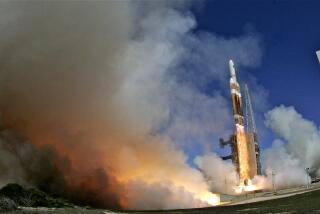Space drone returns to Earth after 469 days on orbit (Video)
- Share via
After orbiting the Earth for more than 14 months on a top-secret mission, an experimental space drone landed Saturday on an airstrip at Vandenberg Air Force Base northwest of Santa Barbara.
Air Force officials offered few details about the mission, saying that the space plane simply provided a way to test new technologies in space, such as satellite sensors and other components.
The pilotless X-37B Orbital Test Vehicle, which looks like a miniature version of the space shuttle, touched down at 5:48 a.m. PDT, Vandenberg officials confirmed. When it was launched from Cape Canaveral, Fla., in March 2011, it garnered international attention.
“Team Vandenberg has put in over a year’s worth of hard work in preparation for this landing and today we were able to see the fruits of our labor,” Col. Nina Armagno, space wing commander at Vandenberg, said in a statement. “I am so proud of our team for coming together to execute this landing operation safely and successfully.”
The drone was initially slated to return Nov. 30, 2011, but the mission was extended.
Although the X-37B program is “classified,” some of the particulars are known. More than 10 years ago, it began as a NASA program to test new technologies for the space shuttle. But when the government decided to retire the aging fleet of shuttles, the Pentagon took over the program and cloaked it in secrecy.
The spacecraft is about 29 feet long, or about the size of a small school bus, with stubby wings that stretch out about 15 feet tip to tip. It is one-fifth the size of the space shuttle and can draw on the sun for electricity using unfolding solar panels. It is designed to stay in orbit for 270 days.
The X-37B was built in tight secrecy by Boeing Co.’s Space and Intelligence Systems unit in Huntington Beach. Engineering work was done at the company’s facilities in Huntington Beach and Seal Beach. Other parts were made at its satellite-making plant in El Segundo.
The X-37B that landed is the second launched by the military. The first X-37B was launched in April 2010, and it landed 224 days later on its own -- fully automated -- at Vandenberg.
That mission was also shrouded in mystery. Due to its clandestine nature, some industry analysts have theorized the X-37B could be a precursor to an orbiting weapon, capable of dropping bombs or disabling foreign satellites as it circles the globe.
RELATED:
‘The original space shuttle’ to come out of hiding in Downey
Drone thought to be UFO on cross-country trip from Edwards AFB
Pentagon to soon deploy pint-sized but lethal Switchblade drones
Follow Hennigan on Twitter @wjhenn
More to Read
Inside the business of entertainment
The Wide Shot brings you news, analysis and insights on everything from streaming wars to production — and what it all means for the future.
You may occasionally receive promotional content from the Los Angeles Times.











